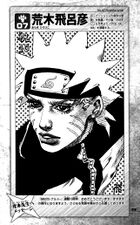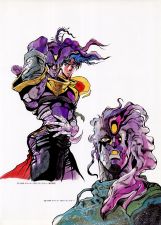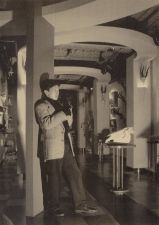Hirohiko Araki
Hirohiko Araki (荒木 飛呂彦, Araki Hirohiko) is a mangaka and author of JoJo's Bizarre Adventure, on which this wikia project is based.
Biography
Hirohiko Araki was born on June 7 1960 in Sendai, Japan. Araki left school before graduation from Miyagi University of Education.
Araki is best known for JoJo's Bizarre Adventure, published in Weekly Shonen Jump from 1987 to 2002, before the series transferred to the seinen magazine Ultra Jump in 2004.
Araki has received the Tezuka Award.
In 2012, Araki celebrates his 30th year as a manga artist and the 25th anniversary of JoJo’s Bizarre Adventure.
JoJo's Bizarre Adventure
The course of the story in JoJo takes the protagonists and the reader through numerous countries and the experience of many cultures. Through various means and at various degrees of factual accuracy and fictionalisation the history and cultures of Britain, the U.S., the Middle East, Japan and Italy in particular are explored and annotated. Many instances of names, styles, concepts or segments of stories originating or expressed in music, film, fashion and other comics and manga are readily identifiable in the story and expression of the manga. JoJo also spans a range of genres including or as a provisional description: Science Fiction, Paranormal & the Supernatural, Mystery & Thriller, and Action. Recurrent themes include Class; Ethics and Morality; Crime and Punishment; Health, Psychology and Memory; and Religion, "Energy" and "Lineage".
The character Rohan Kishibe may be considered a vehicle for the most autobiographical, opinionated or self-conscious elements of JoJo.
Publication
Many of Araki's creations, including JoJo's Bizarre Adventure, have been translated and released in Europe, but so far only JoJo and Baoh have been released in the U.S.; one theory being that Araki's frequent references to Western music, film, and others violate either U.S. or other copyright laws. Publications by Viz Media avoid this problem by replacing certain references within the copy of the manga with thematically comparable alternatives.
Works
- Buso Poker (1980)
- Autoto Man (1982)
- Virginia ni Yohroshiku (1982)
- Magic Boy B.T. (魔少年ビーティー mashōnen bītī 1982–1983)
- Baoh (1984–1985)
- Gorgeous Irene (1985–1986)
- JoJo's Bizarre Adventure (1987—current)
- Part I: Phantom Blood (1987-1988)
- Part II: Battle Tendency (1988-1989)
- Part III: Stardust Crusaders (1989-1992)
- Part IV: Diamond is Unbreakable (1992-1996)
- Part V: Vento Aureo (1996-1999)
- Part VI: Stone Ocean (2000-2003)
- Part VII: Steel Ball Run (2004-2011)
- Part VIII: Jojolion (2011-current)
- JoJo 6251 (1993) (Artbook)
- Under Execution, Under Jailbreak (Collection) (1999)
- JOJO A-GO!GO! (2000) (Artbook)
- The Lives of Eccentrics (2004)
- Thus Spoke Rohan Kishibe - Mutsukabeza (2006)
- Front cover of Cell (scientific journal) (September 7, 2007)
- Rohan at the Louvre (2010)
- Spur Spinoff (2011)





